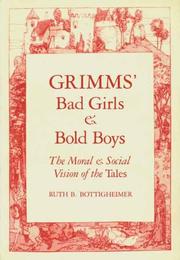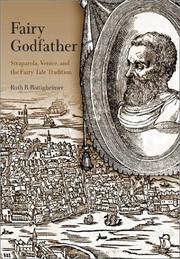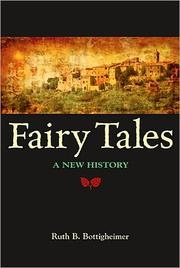| Listing 1 - 10 of 12 | << page >> |
Sort by
|

ISBN: 0300039085 0300043899 Year: 1987 Publisher: New Haven, Conn. Yale University Press
Abstract | Keywords | Export | Availability | Bookmark
 Loading...
Loading...Choose an application
- Reference Manager
- EndNote
- RefWorks (Direct export to RefWorks)
Fiction --- Thematology --- Psychological study of literature --- sprookjes --- opvoeding --- jeugdliteratuur --- leesopvoeding --- Grimm [Brothers] --- Fairy tales --- Psychoanalysis and literature --- Sex role in literature. --- History and criticism --- Sex role in literature --- 82-34 --- 82-34 Sprookje. Legende. Mythe --- Sprookje. Legende. Mythe --- Kinder- und Hausmärchen. --- Grimm's fairy tales --- Grimms Märchen --- Germany --- Social conditions. --- Children's literature. Juvenile literature

ISBN: 0812236807 1322510490 0812201396 Year: 2002 Publisher: Philadelphia, Pa University of Pennsylvania
Abstract | Keywords | Export | Availability | Bookmark
 Loading...
Loading...Choose an application
- Reference Manager
- EndNote
- RefWorks (Direct export to RefWorks)
In the classic rags-to-riches fairy tale a penniless heroine (or hero), with some magic help, marries a royal prince (or princess) and rises to wealth. Received opinion has long been that stories like these originated among peasants, who passed them along by word of mouth from one place to another over the course of centuries. In a bold departure from conventional fairy tale scholarship, Ruth B. Bottigheimer asserts that city life and a single individual played a central role in the creation and transmission of many of these familiar tales. According to her, a provincial boy, Zoan Francesco Straparola, went to Venice to seek his fortune and found it by inventing the modern fairy tale, including the long beloved Puss in Boots, and by selling its many versions to the hopeful inhabitants of that colorful and commercially bustling city. With innovative literary sleuthing, Bottigheimer has reconstructed the actual composition of Straparola's collection of tales. Grounding her work in social history of the Renaissance Venice, Bottigheimer has created a possible biography for Straparola, a man about whom hardly anything is known. This is the first book-length study of Straparola in any language.
Folklore --- Literature --- sprookjes --- magie --- jeugdliteratuur --- anno 1500-1599 --- Fairy tales in literature. --- Fairy tales --- Magic in literature. --- History and criticism. --- Contes de fées --- Magie dans la littérature --- History and criticism --- Histoire et critique --- Straparola, Giovanni Francesco, --- Venice (Italy) --- Venise (Italie) --- Intellectual life --- Vie intellectuelle --- Fairytales --- Children's stories --- Tales --- Homes and haunts --- Bneci (Italy) --- Mleci (Italy) --- Mleti (Italy) --- Venecia (Italy) --- Venezia (Italy) --- Venedig (Italy) --- Venetik (Italy) --- Venetsii︠a︡ (Italy) --- Velence (Italy) --- Benetia (Italy) --- Venetia (Italy) --- Wenecja (Italy) --- Venise (Italy) --- Fenice (Italy) --- Benetke (Italy) --- Vinegia (Italy) --- Burano (Italy) --- Murano (Italy) --- Venice (Lombardo-Venetian Kingdom) --- Straparola, Gian Francesco, --- Straparola, Giovan Francesco, --- Straparola, Giovanfrancesco, --- Straparola, Giovani Francesco, --- Straparole, J.-F. --- Straparole, Jean-François, --- Straparole, --- Venet︠s︡ii︠a︡ (Italy) --- Children's literature. Juvenile literature --- Straparole, Jean François --- Venice --- Anthropology. --- Cultural Studies. --- Folklore. --- Linguistics. --- Literature.
Book
ISBN: 0812280210 0812212940 1322511756 0812201507 Year: 1986 Publisher: Philadelphia (Pa.): University of Pennsylvania Press
Abstract | Keywords | Export | Availability | Bookmark
 Loading...
Loading...Choose an application
- Reference Manager
- EndNote
- RefWorks (Direct export to RefWorks)
This collection of exemplary essays by internationally recognized scholars examines the fairy tale from historical, folkloristic, literary, and psychoanalytical points of view. For generations of children and adults, fairy tales have encapsulated social values, often through the use of fixed characters and situations, to a far greater extent than any other oral or literary form. In many societies, fairy tales function as a paradigm both for understanding society and for developing individual behavior and personality.A few of the topics covered in this volume: oral narration in contemporary society; madness and cure in the 1001 Nights; the female voice in folklore and fairy tale; change in narrative form; tests, tasks, and trials in the Grimms' fairy tales; and folklorists as agents of nationalism. The subject of methodology is discussed by Torborg Lundell, Stven Swann Jones, Hans-Jorg Uther, and Anna Tavis.
82-34 --- Fairy tales --- -Fairy tales --- -82-34 Sprookje. Legende. Mythe --- Sprookje. Legende. Mythe --- Fairytales --- Children's stories --- Tales --- History and criticism --- Social aspects --- 82-34 Sprookje. Legende. Mythe --- Addresses, essays, lectures --- Social aspects. --- History and criticism. --- Fairy tales. --- Folklore. --- Folk beliefs --- Folk-lore --- Traditions --- Ethnology --- Manners and customs --- Material culture --- Mythology --- Oral tradition --- Storytelling

ISBN: 0300064888 Year: 1996 Publisher: New Haven, Conn. Yale University Press
Abstract | Keywords | Export | Availability | Bookmark
 Loading...
Loading...Choose an application
- Reference Manager
- EndNote
- RefWorks (Direct export to RefWorks)
Bible stories
---
Children's literature
---
Children
---
#BIBC:ruil

ISBN: 1438425333 1441608699 9781441608697 9781438425337 9781438425238 9781438425337 1438425236 9781438425245 1438425244 Year: 2009 Publisher: Albany, N.Y Excelsior Editions, State University of New York Press
Abstract | Keywords | Export | Availability | Bookmark
 Loading...
Loading...Choose an application
- Reference Manager
- EndNote
- RefWorks (Direct export to RefWorks)
This work overturns traditional views of the origins of fairy tales and documents their actual origins and transmission. Where did Cinderella come from? Puss in Boots? Rapunzel? The origins of fairy tales are looked at in a new way in these highly engaging pages. Conventional wisdom holds that fairy tales originated in the oral traditions of peasants and were recorded for posterity by the Brothers Grimm during the nineteenth century. The author overturns this view in this account of the origins of these well loved stories. Charles Perrault created Cinderella and her fairy godmother, but no countrywoman whispered this tale into Perrault's ear. Instead, his Cinderella appeared only after he had edited it from the book of often amoral tales published by Giambattista Basile in Naples. Distinguishing fairy tales from folktales and showing the influence of the medieval romance on them, the author documents how fairy tales originated as urban writing for urban readers and listeners. Working backward from the Grimms to the earliest known sixteenth-century fairy tales of the Italian Renaissance, she argues for a book based history of fairy tales. The first new approach to fairy tale history in decades, this book answers questions about where fairy tales came from and how they spread, illuminating a narrative process long veiled by surmise and assumption.
Fairy tales --- Folk literature --- Folklore --- History and criticism. --- History and criticism --- Children's literature. Juvenile literature --- sprookjes --- Folk lliterature
Book
ISBN: 143844222X 1461907349 9781461907343 9781438442228 9781438442211 1438442211 Year: 2012 Publisher: Albany State University of New York Press
Abstract | Keywords | Export | Availability | Bookmark
 Loading...
Loading...Choose an application
- Reference Manager
- EndNote
- RefWorks (Direct export to RefWorks)
Translations of the forewords and afterwords by original fairy tale authors and commentaries by their contemporaries, material that has not been widely published in English.
Fairy tales in literature. --- Fairy tales --- History and criticism.
Book
ISBN: 9780812201390 Year: 2013 Publisher: Philadelphia
Abstract | Keywords | Export | Availability | Bookmark
 Loading...
Loading...Choose an application
- Reference Manager
- EndNote
- RefWorks (Direct export to RefWorks)
Book
ISBN: 9780812201505 Year: 2014 Publisher: Philadelphia
Abstract | Keywords | Export | Availability | Bookmark
 Loading...
Loading...Choose an application
- Reference Manager
- EndNote
- RefWorks (Direct export to RefWorks)
Book
ISBN: 9780773437623 Year: 2010 Publisher: Lewiston, N.Y. Mellen
Abstract | Keywords | Export | Availability | Bookmark
 Loading...
Loading...Choose an application
- Reference Manager
- EndNote
- RefWorks (Direct export to RefWorks)
Book
ISBN: 3525615515 Year: 2003 Publisher: Göttingen Vandenhoeck und Ruprecht
Abstract | Keywords | Export | Availability | Bookmark
 Loading...
Loading...Choose an application
- Reference Manager
- EndNote
- RefWorks (Direct export to RefWorks)
| Listing 1 - 10 of 12 | << page >> |
Sort by
|

 Search
Search Feedback
Feedback About UniCat
About UniCat  Help
Help News
News